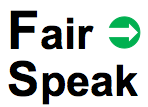Fair communication, or ‘fair speak' to put it more colloquially – what is it really? No one has so far taken out a universal patent for this, and that is probably to the best. The FairSpeak group has no intention to do so either. However, for a number of years we have taken a specific research interest in areas of human activity where opinions differ about whether concrete manifestations of communication should be considered as fair or as potentially misleading or even manipulative.
This applies, for example, to consumer-oriented communication via product naming, packaging design, and labelling, to sustainable promotion of tourism in Europe's peripheries, and to the use of data visualization techniques to either clarify or distort political, commercial, and other messages.
However, the problem has many other facets as well, in recent years brought to the fore by terms such terms as greenwashing, sportswashing, fake news, ‘filter bubbles', echo chambers, etc., and by an increasing recognition of the grey zone between public education, legitimate interest promotion, spin, and 'dark nudging', as well as fair utilization versus abuse of algorithms and artificial intelligence.
An overarching challenge here is that the issue is complex and involves both legislative and ethical aspects, the need to understand people's (in some respects limited) ability to navigate in complex knowledge, emotions, and attitudes, and the ways in which still more refined mixes of words, text, numbers, images, colours, shapes, and real-life experiences can impact these processes. The challenge is enhanced by the circumstance that relevant expertise – which actually does exist – tends to remain entrenched in closed "silos" the inhabitants of which do not talk very much to each other.
FairSpeak has no ambitions to give the definitive answer to what fair communication means in all the mentioned or other contexts. Rather, the ambition is to contribute to creating a more versatile knowledge base and new types of empirical evidence that can qualify the immediate actors' debates on and handling of these issues in practice (politicians, companies, NGOs, authorities, ordinary citizens).
The group members jointly represent several of the central research areas mentioned, brought together in pursuing common goals, as underpinned by CBS' long-standing tradition for fostering interdisciplinarity in meeting urgent societal challenges. The intention is to exploit this momentum further, both in future research initiatives and in educational programme development. This includes the planned Master's degree programme in sustainability where fair communication is, arguably, a necessary if not sufficient precondition for all other progressive developments.

